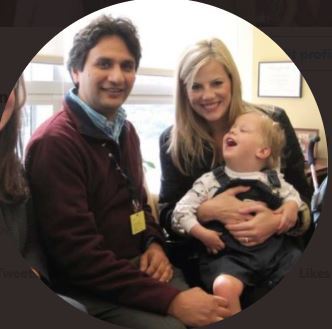Information for Patients and Families | Overview

The Manton Center is enrolling for the state-of-the-art Gene Discovery Core (GDC), a genetic laboratory and database which will compile both genotypic and phenotypic information for patients with orphan disorders. The GDC employs a "hub and spokes" model: the GDC (the hub) will funnel the results of genetic tests to scientists studying each respective disease (the spokes).
By collecting DNA and associating genetic information with clinical information, the GDC will serve as a valuable genetic library that scientists at Boston Children's Hospital and their collaborators around the world can utilize to facilitate the study of disease.
Enrollment with the GDC
All the information regarding enrolling with the GDC can be found on our GDC Enrollment Process page.
Commonly Used Words/Terms – Helpful Terms to Know
Please click on the links below to learn more about some commonly used words and helpful terms to know.
Short for deoxyribonucleic acid, DNA is the genetic material that makes us who we are. This genetic material is passed down from parents to children and is present in all the cells of our body. The four chemical bases that make up our DNA code are adenine (A), thymine (T), guanine (G), and cytosine (C). The order, or sequence, of these bases builds the code that tells our cells how to develop and how to maintain the human body. This DNA code is grouped together into units called genes.
Video/Image
Genes are units of that act like instructions to determine our physical appearance, like eye color and hair color, and how our bodies grow. Genes can also determine whether someone develops certain medical conditions. Together, all the genes in our body make up the genome. Some genes have the instructions for building molecules called proteins. These protein-coding genes make up the exome. The exome is the GDC’s most commonly analyzed test for detecting changes in the DNA that may be linked to genetic disorders.
This genetic test sequences a person’s exome, which includes all the genes that code for proteins. This test is useful for finding genetic variants that may be linked to a genetic disorder.
o Whole Exome Sequencing
o What is Exome Sequencing? | Genetics 101 | Ambry Genetics
This genetic test sequences the entire human genome, not just the exome. More specifically, it sequences both protein-coding regions and non-protein-coding regions to detect potentially disease-causing genetic variants.
o Whole Genome Sequencing and You
For patients who have previously had clinical WES but remain undiagnosed, the GDC offers to run participants’ WES data through our own pipeline to see if there are any new findings. With the constant advancements in technology and through collaboration with researchers across the globe, our knowledge of genetics and rare diseases is always expanding. We hope that by reanalyzing WES data, we will come closer to reaching a diagnosis.
Sometimes additional studies are needed to understand the impact of changes in the DNA code. For example, it can be helpful to study the function of proteins that are expressed by certain genes and how these proteins interact with other molecules in the body. Using these functional studies, we may be able to work with your physician and other scientists to better understand an unclear genetic result.
New Patient Resources
GenomeConnect
GenomeConnect is an online registry where participants can contribute to the understanding of genetics and health by sharing de-identified genetic and health information. This platform also allows participants to learn about research opportunities and connect with other participants through Genome Connect’s participant matching feature.
Global Genes (contains toolkits)
- Becoming an Empowered Patient: A Toolkit for the Undiagnosed
For patients without a diagnosis, navigating through the healthcare system can feel overwhelming. This toolkit provides tips on how to feel more prepared, confident, and educated to take charge of the journey to find a diagnosis.
- Parenting a Child With a Life-Limiting Illness
Living with a child with a life-limiting illness can be understandably stressful for a family. This toolkit offers advice on maintaining family relationships and explains special equipment that may be used in your child’s care, as well as what financial and community resources are available to support you and your child.
- Genetic Testing: Is This My Path to a Diagnosis
This informative toolkit provides an overview of basic genetics and lists current genetic testing techniques, along with an explanation of each test’s purpose, general cost, limitations, and time to complete.
Exceptional Lives
Exceptional Lives is a not-for-profit organization that provides information on resources and services for families of kids with special needs. For residents of Massachusetts and Louisiana, this platform is especially useful as it helps parents and caregivers find doctors and programs near them. For residents of other states, the site provides a helpful guide on available national programs.
Sources that contain interactive elements (videos, images)
Learn.Genetics
Learn.Genetics is a website that offers multimedia educational material to improve understanding of genetics in a fun and interactive way.
Contact Us
If you have any further questions or would like further information about the GDC, please feel free to reach out and contact us. We would be more than happy to help!
